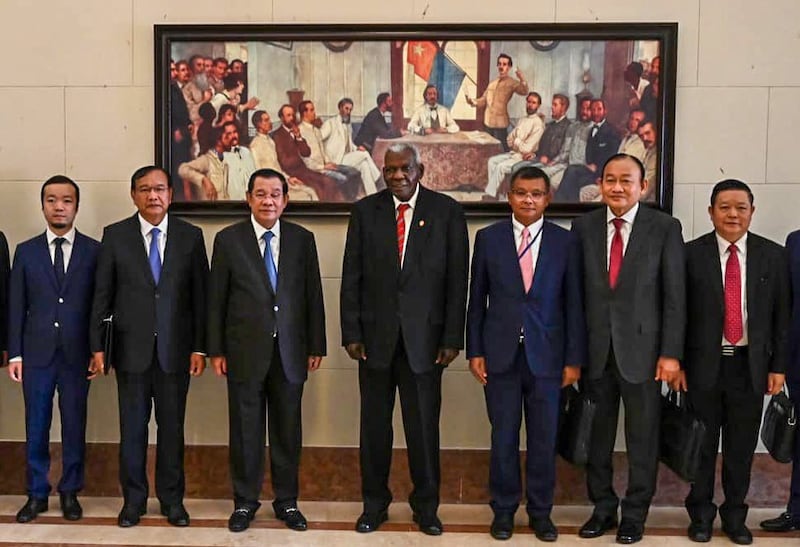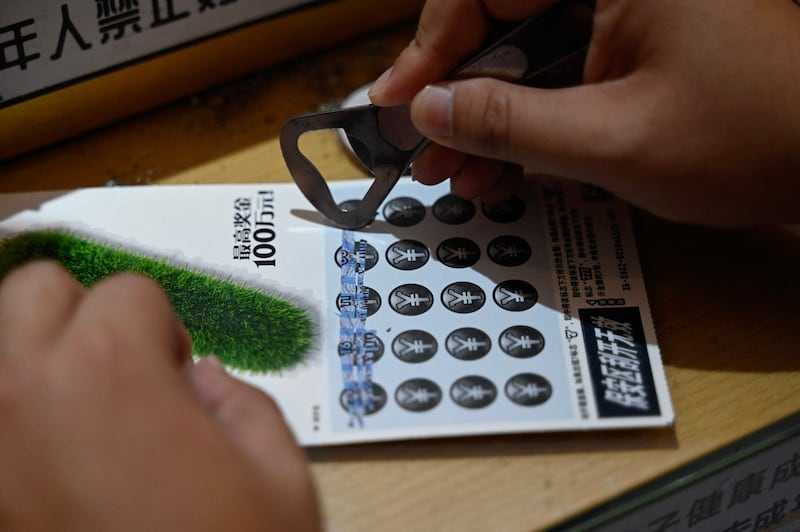This is the second article in a three-part series on the Prince Group. For Part I of RFA’s investigation, click here . For Part III, click here.
Since its founding eight years ago, the Prince Group has emerged as one of Cambodia’s most ubiquitous brands. Its name touches nearly every corner of the Cambodian marketplace: shopping malls, supermarkets, banks, casinos, apartments, cinemas, office blocks, private jets, pleasure boats, film production, hotels, venture capital firms, ride-hailing services, restaurants and more.
The company’s reach also extends well beyond Cambodia. Its leaders have a controlling interest in at least three companies listed on the Hong Kong stock exchange. Prince Chairman Chen Zhi, an enigmatic 36-year-old Chinese national who rose to become a top adviser to both Cambodia’s current and former prime ministers, owns a quarter of Cuba’s national cigar company, valued at $2.8 billion, as well as a $114 million office building in one of London’s richest neighborhoods.
In total, RFA has identified more than $1.5 billion of assets and investments in 31 countries in which senior Prince Group executives have a stake.
The group, however, has never fully accounted for its wealth. It maintains that its multi-billion dollar growth over the past eight years is due to savvy business practices and what was, until recently, Cambodia’s relentlessly booming property market.
But an RFA investigation that includes court records, banking documents, payment slips and interviews with company insiders tells a different story.
In the first part of our series, RFA examined the Prince Group’s rapid rise, political connections and alleged criminality.
Here we explore how the Prince Group has stealthily moved millions of dollars around the world in a way that experts say bears many of the hallmarks of money laundering.
RFA’s investigation has revealed that a company controlled by Chen, Amiga Entertainment, registered in the Isle of Man, is in fact a shell company that uses these suspected money laundering tactics.
RFA’s investigation supports allegations made by Chinese prosecutors that much of the money Prince has used to build its empire was acquired through fraud, including hundreds of millions from illegal gambling and an extensive money laundering network.
RFA has attempted to contact Chen on numerous occasions without success, but the Prince Group disputes the charges against both the company and its chairman. A spokesperson for the company responded to allegations of illegality in Chinese courts by claiming it is a victim of identity theft and that criminals have used its corporate identity to carry out illicit activities.

The wealthy uncle
In December 2018, a company owned by Prince Group founder Chen named Amiga Entertainment applied for an account with the Cayman National Bank in the Isle of Man. The bank rejected the company’s request, despite the fact that by then the Prince Group was a key player in the Cambodian marketplace. A hack of the bank’s records 11 months later gives a clue as to why.
Money laundering is the process of making money gained through illegal means appear legitimate. It usually involves bouncing the money through a series of fictitious transactions, often spanning multiple jurisdictions, to give the illusion that it is the product of legitimate business activity.
Emails, transaction records and other documents contained within the hack, which was shared by whistleblowing non-profit Distributed Denial of Secrets, chart Amiga Entertainment’s failed attempt to land an account with Cayman National Bank. The hack showed the Prince Group was unwilling to reveal the source of its money – even when applying for a bank account.
Any time a person or a business applies for a bank account or conducts a large transaction, bank officials are supposed to ask where the money comes from and to verify the claims as best they can. This process is designed to prevent criminals from getting access to the financial system and spending their ill-gotten gains. In the case of Amiga Entertainment, the due diligence carried out by Cayman National Bank shows just how little the mega-conglomerate was willing to share about the source of its funds.
At the time of the application, Amiga’s immediate parent company was an Isle of Man online casino operator named Ableton Prestige Global Limited. An email to the bank by Ableton director John Corteen, which was among the hacked documents, reveals that Ableton’s owners were Prince Group chairman Chen and his wife, Li Caiyun. Corteen included a link to a Prince Group advertisement in the Phnom Penh Post to provide “some details of Mr. Chen’s businesses.”
The bank responded by seeking more information about the origins of Chen’s wealth.
“In respect of Mr. Chen Zhi’s source of wealth, Mr. Chen Zhi first obtained a personal loan of US$2 million from his uncle to start Cambodian Heng Xin Real Estate Investment Co. Ltd. sometime in or around 2011,” reads an internal Cayman National Bank file note summarizing the response of Chen’s representatives, dated July 2019.
Chen’s explanation for the origins of his fortune would be unacceptable to most banks, according to financial crime expert Graham Barrow, who spent 25 years working for banks and the wider financial services industry.
“An uncle who lends you $2 million is such a generic statement as to be wholly inadequate for any financial institution to accept because they need to understand the ultimate source of wealth, not an intermediate source,” Barrow told RFA. “It gives the impression that they don’t want anyone to dig too deep into their source of wealth.”
A little over two months after the file note was created, a compliance official at the bank sought more details, in an email dated Oct. 7, 2019. Crucially, she wanted to know the name of the uncle who loaned Chen the $2 million in 2011 and where he got the money.
Chen and his representatives never responded, which is another red flag, according to Oliver Bullough, author of " Moneyland: Why Thieves and Crooks Now Rule the World and How To Take It Back."
“If someone asks you to explain your wealth and you go away, that’s not a good sign because it isn’t that difficult to do,” Bullough told RFA.
Corteen and Chen did not respond to requests for comment on the issues raised in this story. Emails to the address listed on Amiga’s website bounced back with an error message indicating the message had been blocked, while emails to Ableton went unanswered.

Don’t ask, don’t tell
If the mystery funds set off alarm bells, the ownership structure of Amiga may well have rung others.
At the time of its incorporation in October 2018, Amiga Entertainment’s ultimate parent company was the Singapore-registered Infinite Deemarco Pte Ltd. The man listed in Singapore company records as Infinite Deemarco’s owner at that time, a Filipino American lawyer named Henry Yeh, told RFA that he had no idea where the company’s financing came from.
“I was told that it came from China as Prince [management] are all from China,” Yeh said. “They have every right not to tell me or to lie to me as I was just an employee.”
In admitting that he was the owner in name only, Yeh shed light on how Prince Group frequently manages its subsidiaries as a series of shell corporations so that their connection to the group is not apparent from their shareholders and directors. A 2022 report by the World Bank warned that such structures are ripe for abuse.
This “don’t ask, don’t tell” approach to managing billions of dollars is familiar to Kimberly Kay Hoang, a University of Chicago sociology professor who spent 18 months shadowing Southeast Asian investment professionals for her book " Spiderweb Capitalism." The book reveals the way high-level business is done in the region, allowing politically connected individuals to merge their illicit wealth with legitimate business enterprises.
CEOs like Yeh find themselves “assuming all the criminal and reputational risk and being highly compensated for doing it,” Hoang told RFA. In exchange, they “generally don’t ask questions about the origin and source of funds.”Yeh is not accused of any wrongdoing.
Eighteen months after he founded the company, Yeh transferred his shares to an individual who holds directorships in three Prince Group companies in Cambodia, according to Singaporean and Cambodian corporate records reviewed by RFA.
Ben Cowdock, a senior investigator at Transparency International U.K., also believes Yeh’s description of arrangements at Infinite Deemarco are cause for concern.
“If you have the CEO and shareholder of a company not knowing where their business earns money, they’re either wildly negligent or acting on behalf of someone else,” Cowdock told RFA, having been briefed on Infinite Deemarco’s ownership structure. “Those putting their name on official paperwork for a third party is a widely known method of avoiding undue scrutiny from the authorities.”

Slot machines and washing machines
In 2020, Beijing established a special police task force to investigate the Prince Group. Subsequent court cases against low-level employees have determined that at least 5 billion yuan ($700 million) of Prince Group funds are from illegal gambling.
RFA’s investigation into Amiga Entertainment sheds additional light on how Prince Group sought to hide where its money came from.
It was during Yeh’s brief tenure as Infinite Deemarco’s owner and CEO that the company incorporated Amiga Entertainment as its subsidiary in the Isle of Man. Yeh told RFA that Amiga Entertainment’s business model was, “to make similar games without infringing IPs [intellectual property].” In essence, to produce cheap knock-offs of already existing video games.
Documents reviewed by RFA show the true business model was more complex.
Amiga Entertainment’s website showcases the games it develops. Each one is essentially a slot machine, with players placing bets in the hope that certain combinations of symbols appear. Such games are legal in the Isle of Man. However, banking records seen by RFA show that Amiga was licensing these games to companies in China, where – outside of the state lottery – all forms of gambling are strictly forbidden.

The contracts specified that the Chinese companies would pay £940,000 ($1 million) a year in exchange for the right to market one of Amiga Entertainment’s games to their customers. Additionally, the Chinese companies would pay 30% of any revenue earned. (Asked about these contracts, Yeh responded, “I don’t know anything about copycat games for millions.”)
The twist, according to a former Prince insiderwho was familiar with the workings of Amiga Entertainment and its parent companies, is that these transactions were fictitious. The insider asked not to be named for safety reasons.
“[Amiga Entertainment] is the one they used for laundering money,” the person told RFA. “They pumped in all the money through here.”
The companies in China were neither utilizing the games nor paying for them, the source claimed. Instead, the contracts signed between Amiga Entertainment and the Chinese companies were used to justify large cash transfers between Southeast Asia and the Isle of Man.
Typically, businesses move money from one area of their operation to another through a bank. But the money sent to Amiga Entertainment came instead from a money services operator in Hong Kong. Also known as remittance agencies, money services operators transfer funds internationally on behalf of customers, who are frequently people or small businesses that cannot access traditional banking. Some, such as Western Union, have become household names. There are, however, thousands of smaller operators across the world, such as the one used by Amiga Entertainment’s purported Chinese clients. Remittance agencies charge far steeper fees than banks, and it is highly unorthodox for a large company to move money in this way. With the higher fees, though, come fewer questions.
“The remittance company doesn’t care where the real source of money is,” the person said.
Copies of remittance slips, contracts and invoices reviewed by RFA bore details that correlated with payments that could also be identified in the Cayman National Bank leak. While Amiga Entertainment never had an account with the bank, a money services operator that handled payments for the company was a client. (Four payments worth a total of $830,000 were identified within Cayman National Bank’s records as destined for Amiga Entertainment Limited all bore the reference CLA0878, which was also the payment reference used on the remittance slips reviewed by RFA.)
“The Isle of Man will ask what’s the reason for the money, so you need a proxy in China,” the Prince insider said, referring to the licensees. In reality, “the money never originated in China,” they added.
Once the money had been remitted to Amiga Entertainment’s account in the Isle of Man, it would begin its journey up through the various layers of the company’s ownership, the source continued.
Corporate records seen by RFA back up the source’s account and indicate that the ultimate destination for the funds would be Chen and his wife’s family office in Singapore. The money would appear as the legitimate profits from the couple’s investment in successful Isle of Man gambling businesses.
An internal spreadsheet of Amiga Entertainment’s finances viewed by RFA suggests that more than $100 million was moved this way.
Transparency International’s Cowdock said the transactions appeared highly suspicious and called on the Isle of Man to investigate.
“If someone is selling licenses for gambling games to a country where this activity would be illegal, and accepts payments outside of usual banking channels, this is a major red flag that needs investigating,” said Cowdock.
The Prince Group’s director of communications, Gabriel Tan, told RFA in an email that the company’s “primary focus lies in investments and developments within Cambodia” and that it is “not involved in the allegations you mentioned regarding activities in … Singapore, Cuba, or the Isle of Man.”
“In all his business dealings, Chairman Chen Zhi consistently complies with the laws of the jurisdictions in which he operates, as well as with those governing him as a Cambodian citizen,” Tan added.
Messages seeking comment sent to the contact address listed on Amiga Entertainment’s website returned error messages, suggesting the company’s servers were not properly set up to receive emails.
Spread the wealth
Despite his success as a Cambodian citizen, Chen and other senior Prince Group figures in recent years have begun relocating their lives from Phnom Penh to the United Kingdom and the United States.
Chen is listed in British corporate records as the owner of a $114 million office block in the heart of London’s financial district and a mansion worth in excess of $25 million on the city’s exclusive Avenue Road.
Another senior Prince executive is the owner of two British companies that own 17 London apartments purchased for a total of $32 million.

Across the Atlantic, three Prince Group executives own mansions in suburban Los Angeles worth a total of $8 million. One of them also owns a 26-meter Sunseeker pleasure yacht docked off the coast of California, along with a luxury car dealership and a sex toy manufacturer in the state, according to California court and corporate records reviewed by RFA.
High-end homes in London and LA are typical trappings of the ultra-wealthy. But a source close to Cambodia’s Interior Ministry suggested another motivation for the Prince executive migration: having a place to run to if China’s investigation into the conglomerate expands.
“In 2019, the Chinese ambassador told Chen Zhi to cease all criminal acts and not to interfere in investigations into his people,” the source said, asking not to be named as they were not authorized to speak publicly. “The Chinese government has not come to extradite anyone since Covid began, but they will.”
This is the second article in a three-part series on the Prince Group. For Part I of RFA’s investigation, click here . For Part III, click here.
Edited by Abby Seiff, Jim Snyder, Mat Pennington and Boer Deng.
